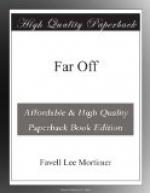At Pekin is the emperor’s palace. The gardens are exceedingly large, and contain hills, and lakes, and groves within the walls, besides houses for the emperor’s relations.
At Nankin is the China tower. It is made of China bricks, and contains nine rooms one over the other. It is two hundred feet high, a wonderful height.
Of what use is it? Of none—of worse than none. It is a temple for Buddha, and is full of his images.
At Canton there are so many people that there is not room for all in the land; so thousands live on the water in bouts. Many have never slept a single night on the shore. The children often fall overboard, but as a hollow gourd is tied round each child’s neck, they float, and are soon picked up.
For a long while the Chinese would not allow foreigners to come into their cities. A great many foreign ships came to Canton to buy tea and silk; but the traders were forbidden to enter the town, and they lived in a little island near, and built a town there called Macao.
But lately the Chinese emperor has agreed to permit strangers to come to five ports, called Shang-hae, Ning-po, Foo-choo, Amoy, and Hong-Kong.
This last port, Hong-Kong, is an island near Canton, and the English have built a city there and called it Victoria.
THE TWO RIVERS.—There is one called Yeang-te-sang, or “the Son of the Ocean.” It is the largest in Asia.
The other is the Yellow River, for the soft clay mixed with the water gives it a yellow color.
LAKES.—There are immense lakes, covered with boats and fishermen.
But the best fishers are the tame cormorants, who catch fish for their masters.
THE TWO GREAT WONDERS.—The great CANAL is wonder. It joins the two rivers; so that a Chinese can go by water from Canton to Pekin.
The great WALL is a greater wonder, but not nearly as useful as the canal.
This wall was built at the north of China to keep the Tartars out. It is one thousand five hundred miles long, twenty feet high, and twenty-five broad. But there were not soldiers enough in China to keep the enemies out, and the Tartars came over the wall.
The Emperor of China is a Tartar.
The Empress does not have small feet, like the Chinese.
It is the Tartars who forced the Chinese to shave their heads, for they used to tie up their hair in a knot at the top of their heads. Many of the Chinese preferred losing their heads to their hair. Was it not cruel to cut off their heads, merely because they would not shave them? But the Tartars were very cruel to the Chinese.
KNOWLEDGE AND INVENTIONS.—We must allow that the Chinese are very clever. They found out how to print, and they found out how to make gunpowder, and they found out the use of the loadstone. What is that? A piece of steel rubbed against the loadstone will always point to the north. The Chinese found out these three things, printing, gunpowder, and the use of the loadstone, before we in Europe found them out. But they did not teach them to us; we found them out ourselves.




